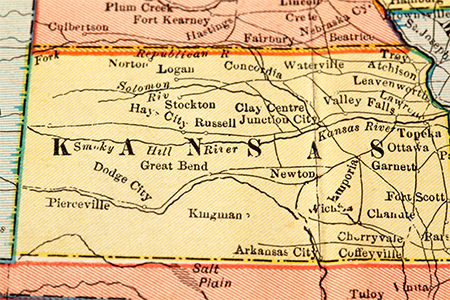You May Also Like
KANSAS CPA EXAM & LICENSE REQUIREMENTS 2024
Kansas has particular guidelines for its route to CPA licensure.

The world of business and finance relies upon the work of accountants. Even government agencies and non-profit organizations need internal auditors and tax experts to help make sure the books are efficiently managed. Law enforcement needs accountants too, to help investigate white collar criminals as well as those who attempt to launder ill-gotten gains through seemingly legitimate channels.
Though there are many options for an accountant to choose from—including a myriad of certifications—a state-issued Certified Public Accountant (CPA) license remains the most prestigious in the field. Each state has their own criteria for licensure but if you live in, or wish to practice in Kansas, keep reading to discover how to become a CPA in the state.
Kansas has particular guidelines for its route to CPA licensure. The Kansas Board of Accountancy (KSBOA) requires that all applicants wishing to sit for the CPA exam be state residents, have a Social Security number and meet specific educational requirements. The KSBOA does not require that you be a U.S. Citizen to become a CPA however.
In-State Residency
To meet the state residency requirement, you will need to provide proof of residence. The approved documents are a valid state-issued driver’s license or a copy of a mortgage or bill that reflects your residency in the state. You may also show proof of ownership in case you own a business, a letter from a Kansas-based public accountancy firm where you are employed, or a copy of military orders showing you are stationed in the state.
Education
The educational requirement portion of the process are the longest and possibly most grueling. Before you even start, make sure that your chosen institutions are regionally accredited by agencies recognized by the KSBOA. If your coursework cannot be recognized by the board, you may have to take additional courses or find a way to practice accountancy without a CPA license. Prior to embarking on your education, you might seek out practicing CPAs and discuss how they completed their education and see if they have recommendations.
To meet the state’s education requirements, you must have a bachelor’s degree and a total 150 semester hours in coursework that satisfies the following criteria:
42 semester hours studying business and general education courses. These hours must include some or all of the following:
- Macro and microeconomics
- One upper-level economics course
- Two courses covering business law
- Algebra or some other higher level math
- Statistics
- Computer science
- Finance
- Management
- Marketing
11 hours studying written and oral communications. You might select courses such as the following:
- Technical writing
- Business communications
- Public Speaking
- Interpersonal communications
30 hours studying the theory and practice of accounting including, but not limited to:
- Upper level financial accounting
- Upper level managerial accounting
- Auditing
- Upper level accounting systems
While you are pursuing your education, discuss your needs with an advisor who is familiar with the rules and regulations regarding becoming a CPA in Kansas. If you are attending a college or university in Kansas, your advisor in the Accounting Department should be knowledgeable of these guidelines and be able to direct your course selection to optimize your education. As you near graduation, see if the university offers an accredited course in CPA preparation. Such a course might be a good idea, and collecting college credit for it will only benefit your application
CPA Examination
If you feel secure in your knowledge of accounting fundamentals, Kansas will allow you to apply to take CPA exam prior to graduation. Eight weeks before graduation, you may submit your official transcripts, but you will not receive a Notice to Schedule (NTS) until you have completed all of your work. The benefit to this is that you can schedule your first CPA exam immediately upon graduating.
When you sit for the CPA exam make sure that you are as prepared as you possibly can be. The AICPA has devised one of the most difficult professional exams in the nation. Items are frequently proposed and updated by working CPAs who feel that examinees need to be tested in certain areas. The four parts of the exam are as follows:
- Financial Accounting and Reporting (FAR)–This section covers financial reporting frameworks from industry experts. Candidates are asked to compare statements that reflect different reporting standards.
- Auditing and Attestation (AUD)–The AUD portion tests your knowledge of the International Standards of Auditing as well as U.S. standards.
- Regulation (REG)–Your professional and legal ethics and responsibilities are covered in this test section.
- Business Environment and Concepts (BEC)–This portion covers general business and international business concepts. Good written communication skills are essential in order to complete this section of the test.
Ethics Examination
Once you have passed the uniform CPA exam, you have one more standardized test to sit for. This time, you can study for it at home. The AICPA’s Ethics exam isn’t considered difficult, but you will need to pass it with a score of at least 90. You can order it through the AICPA website. The self-study course comes on a CD-ROM and the course takes approximately 11 hours to complete. The disc includes multiple-choice questions for review and study.
Experience
From this point, all you’ll need to do to satisfy the Kansas Board is to gain one year of experience practicing accounting in a public, private, governmental or academic institution. You will need to have a licensed CPA validate your year of experience.
Seek out more information on licensure and other rules governing your profession at the KSBOA’s website: Kansas Board of Accountancy.